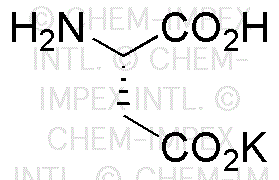L-Aspartic acid potassium salt is widely utilized in research focused on:
- Nutrition Supplements: This compound is often included in dietary supplements aimed at enhancing athletic performance and recovery due to its role in energy production and amino acid synthesis.
- Pharmaceuticals: It serves as an excipient in drug formulations, improving solubility and stability, which is crucial for effective delivery of active pharmaceutical ingredients.
- Agriculture: Used as a fertilizer additive, it promotes plant growth by enhancing nutrient absorption and improving stress resistance, making it valuable for crop yield optimization.
- Food Industry: It acts as a flavor enhancer and is utilized in food products to improve taste profiles, appealing to consumers looking for healthier food options.
- Biotechnology: In research labs, it is employed in cell culture media, supporting the growth of various cell types, which is essential for studies in genetics and drug development.
Informations générales
Propriétés
Sécurité et réglementation
Applications
L-Aspartic acid potassium salt is widely utilized in research focused on:
- Nutrition Supplements: This compound is often included in dietary supplements aimed at enhancing athletic performance and recovery due to its role in energy production and amino acid synthesis.
- Pharmaceuticals: It serves as an excipient in drug formulations, improving solubility and stability, which is crucial for effective delivery of active pharmaceutical ingredients.
- Agriculture: Used as a fertilizer additive, it promotes plant growth by enhancing nutrient absorption and improving stress resistance, making it valuable for crop yield optimization.
- Food Industry: It acts as a flavor enhancer and is utilized in food products to improve taste profiles, appealing to consumers looking for healthier food options.
- Biotechnology: In research labs, it is employed in cell culture media, supporting the growth of various cell types, which is essential for studies in genetics and drug development.
Documents
Fiches de données de sécurité (FDS)
La FDS fournit des informations de sécurité complètes sur la manipulation, le stockage et l’élimination du produit.
Spécifications du produit (PS)
Le PS fournit une description complète des propriétés du produit, notamment sa composition chimique, son état physique, sa pureté et les exigences de stockage. Il détaille également les plages de qualité acceptables et les applications prévues du produit.
Certificats d'analyse (COA)
Recherchez des certificats d'analyse (COA) en saisissant le numéro de lot du produit. Les numéros de lot et de lot se trouvent sur l'étiquette d'un produit, après les mots « Lot » ou « Lot de fabrication ».
Numéro de catalogue
Numéro de lot/série
Certificats d'origine (COO)
Ce certificat d'exploitation confirme le pays dans lequel le produit a été fabriqué, et détaille également les matériaux et composants utilisés et s'il est issu de sources naturelles, synthétiques ou autres sources spécifiques. Ce certificat peut être requis pour les douanes, le commerce et la conformité réglementaire.
Numéro de catalogue
Numéro de lot/série
Fiches de données de sécurité (FDS)
La FDS fournit des informations de sécurité complètes sur la manipulation, le stockage et l’élimination du produit.
DownloadSpécifications du produit (PS)
Le PS fournit une description complète des propriétés du produit, notamment sa composition chimique, son état physique, sa pureté et les exigences de stockage. Il détaille également les plages de qualité acceptables et les applications prévues du produit.
DownloadCertificats d'analyse (COA)
Recherchez des certificats d'analyse (COA) en saisissant le numéro de lot du produit. Les numéros de lot et de lot se trouvent sur l'étiquette d'un produit, après les mots « Lot » ou « Lot de fabrication ».
Numéro de catalogue
Numéro de lot/série
Certificats d'origine (COO)
Ce certificat d'exploitation confirme le pays dans lequel le produit a été fabriqué, et détaille également les matériaux et composants utilisés et s'il est issu de sources naturelles, synthétiques ou autres sources spécifiques. Ce certificat peut être requis pour les douanes, le commerce et la conformité réglementaire.


